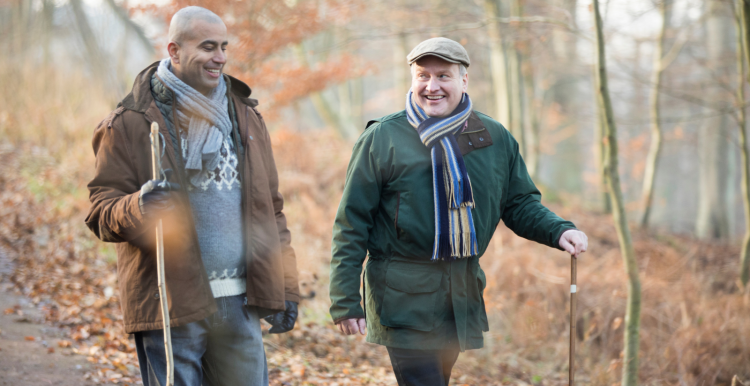What is Arthritis?

The word arthritis means ‘inflammation in the joints’.
Inflammation is a difficult thing to imagine and describe, but it is part of the body’s normal healing process, just like the healing of a cut or a bruise. Inflammation can be thought of as being like a bruise with swelling on the inside of the joints, and this can cause pain and stiffness.
A normal joint is the connection between 2 bones. The ends of the bones are covered by a layer of cartilage which acts as a shock absorber to protect the bones form damage. A thin membrane called the synovial membrane lines the joint and produces a small amount of joint fluid called synovial fluid which helps to lubricate the joint. The joint capsule holds the joint together loosely. Strong ligaments (not shown) help to anchor the bones together firmly and muscles on top and across the joint the joint (not shown) move the joint in different directions.
The most common type of arthritis is osteoarthritis. This is often wrongly called “wear and tear” or “degenerative” arthritis and is more common in older people.
The next most common types of arthritis are rheumatoid arthritis, where the immune system attacks the joints, causing swelling, pain and stiffness, and gout which is caused by crystals of uric acid irritating the joints. Rheumatoid arthritis and gout are two examples of “inflammatory arthritis” but there are many other forms of inflammatory arthritis including psoriatic arthritis and spondyloarthropathy (including ankylosing spondylitis).
What causes arthritis?
As there are so many different types of arthritis, there is no one cause, but the following factors may be important.
- Genetics – arthritis can sometimes run in families, especially rheumatoid arthritis and osteoarthritis of the fingers
- Gender – some types of arthritis are more common in women and some in men
- Age – osteoarthritis is usually a problem in later life whereas other types of arthritis such as rheumatoid arthritis and spondyloarthropathy commonly start in younger adults
- Injury – damage to a joint, for example a broken bone or a football injury can cause osteoarthritis later in life
- Infections – certain viral and other infections can trigger some types of arthritis
- Lifestyle – osteoarthritis, especially osteoarthritis of the knees and hips is more common and causes more pain in people who are overweight. Drinking alcohol can trigger an attack of gout. Smoking is more common in people who develop rheumatoid arthritis
Tips To Stay Well During Winter
The longer, chilly nights can be dreary, but there are a lot of things we can do to lift our spirits and keep us healthy during the colder months. Arthritis Action’s experts have put together some tips to help you look after your health and wellbeing over the colder winter months.
Move Every Day
If you live with arthritis, it is important to keep your joints mobile and use your muscles, to retain health and strength. Movement is great for helping with pain and improving stiffness. Many people with arthritis worry that moving can harm the joints, however this is not true: regular movement is essential to strengthen the muscles that protect and support our joints.
Take a look at our chair-based exercises page, developed to improve the range of motion and joint function for people with arthritis even if you don’t want to leave the home.
Get Fresh Air
Getting fresh air, even if we are finding ourselves inside for long periods of time, is good for our minds and our bodies. However, be mindful of getting too cold. Try to slowly raise your internal temperature with some gentle exercises, whilst cracking a window open to get some fresh air through your home for a few minutes each day.
Avoid Portion-Distortion
Being inside more during the colder period of the year means having unlimited access to the kitchen and the snack cupboard! Understanding the standard portion size could help you to avoid larger-than-usual portions of food. Visit our Weight Management and Arthritis page for more advice on how to eat healthily.
Be Snack Wise
Boredom is one of the main reasons we snack. Make sure you hydrate with enough water in the day, and replace unhealthy snacks with nutrient-rich, lower calorie options. Mixed nuts, chopped veggies with reduced fat hummus, or a few tropical fruits make perfect healthy snacks.
Stay Strong
If you feel safe doing so, find ways of doing resistance training 2-3 times a week. Ask your GP if you are unsure how to begin this. You can use your own body weight, exercise bands, or household objects such as tins of food or water-filled containers to offer some resistance. Take a look at our online exercise page for some ideas. You can also have a look at our partners 10today, for a daily dose of 10-minute exercises to keep you moving throughout winter.
Create a Wellbeing Plan
It is important to focus on your mental wellbeing as the days get shorter. Anxiety and stress may develop when you feel a lack of autonomy and perhaps feel everything is out of your control. Try coming up with your own ‘Wellbeing Plan’, to bring a sense of balance to your life.
Each day, write down 3 to 10 words that represent how you are currently feeling – be honest! Take a look at those words, as these reflect your emotions and show how you are currently feeling. Once you’ve done this, you can begin to set out ideas of how to overcome the feelings you have written down, and build your own plan of action. For example:
- Connect with others: You might have written down the word ‘lonely’. Take control by looking through your contact list or address book, and call, Zoom or FaceTime a friend or family member. Before the end of the call, make a date for another one. Ensure you have some communication with others and find out what they are doing or how they are feeling. They may be very happy that you asked them.
- Make your day tastier: You may have written ‘eating too much food’ or ‘not eating enough’. This may be because you are feeling bored or too fearful of going out shopping, so as part of your wellbeing plan add how to get your food, what you will eat and when. Try something different, to make the experience of cooking and eating an adventure.
- Get creative: You may have written ‘bored’. Perhaps there is something that you have always wanted to do but never tried. Now is the time to write that novel, take up painting, try a new form of exercise, or jot down your recipes into a book. You could always put your new ventures to good use and make them into handmade Christmas or Birthday presents for your family and friends.
To read more information about the different types of Arthritis, peoples stories, cost of living resources and much more, visit Arthritis Action
*The image that is used in this article has been supplied by Canva and has no direct relation to the content of this articles subject



